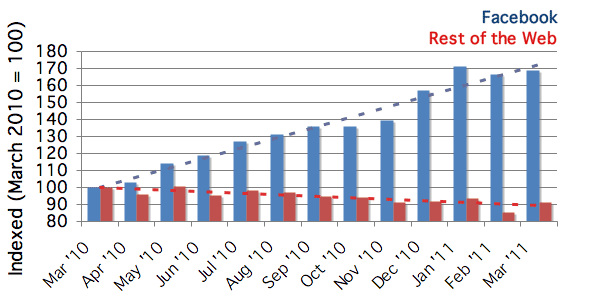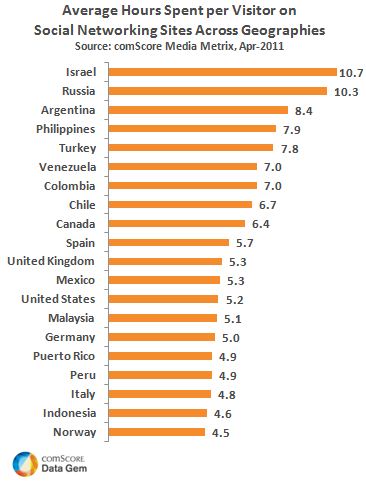comScore: The network is "shrinking" because of Facebook

The graph shows the percentage of growth by March 2010, where March is taken as 100.
The company comScore has released another batch of controversial statistics . They cite figures for the total time spent by American users on various websites on the Internet from March 2010 to March 2011.
The graph shows that for the year, "traffic" Facebook has grown by about 70% (in minutes). At the same time, all other sites on the Internet together lost about 10% (in minutes).
Of course, time is a limited resource, and if one site becomes the central “point of attraction,” then all others lose because of this. But the average American user spends more than four hours per month on Facebook, the penetration of social networks has reached 90% of the network audience.
')
Perhaps in a few years, a similar fate awaits Russia (Ukraine, Belarus). If we assume that the Internet audience reaches its limit, as in the United States, and the penetration of social networks also reaches 90%, then the consequences may be even more serious than in America, because Russians are among the world leaders in the amount of time spent in social networks ( 10.3 hours per month ). Here we are overtaking the Americans.

So in Russia, the drop in traffic on all other sites may be more than 10%.
However, there are many other indicators, according to which the argument about “network shrugging” can be challenged. The main thing is that there is objective statistics on user activity on the Internet: traffic in terabytes, the number of search queries, the number of downloaded videos, etc. All these indicators are growing, so it is too early to talk about "shrinking" the Web and turning all sites into an "information appendix" for social networks.
In addition, the above schedule should not be misleading, as if on Facebook users spend more time than on other sites on the Internet. In fact, the share of Facebook is now about 12%.
Source: https://habr.com/ru/post/122828/
All Articles